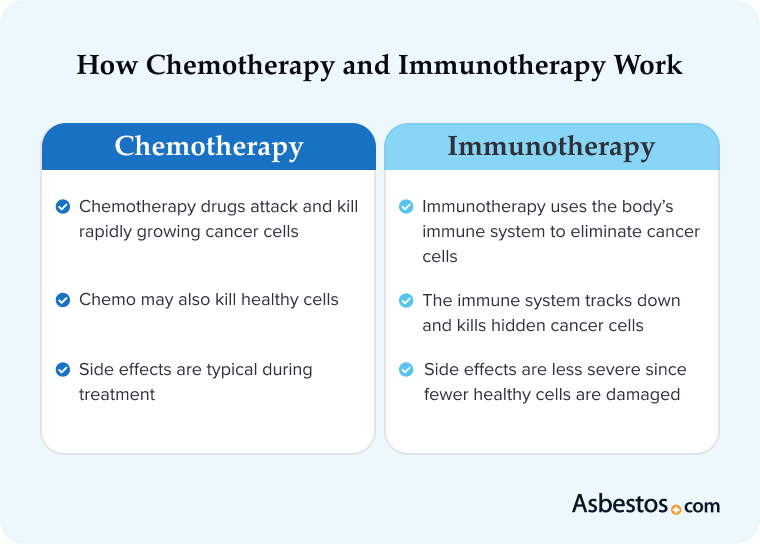Immunotherapy vs. Chemotherapy
Chemotherapy and immunotherapy are both systemic treatments for cancer that work by distributing certain drugs throughout the body. When recommending immunotherapy vs. chemotherapy to treat mesothelioma, specialists consider the individual patient as well as the type and stage of the disease.

What Is Immunotherapy?
Immunotherapy is a type of cancer treatment that helps the body’s immune system recognize and kill mesothelioma cells. Normally, the immune system defends the body against harmful invaders like bacteria and viruses. But cancer cells can hide or disguise themselves to avoid detection. Immunotherapy works by making it easier for the immune system to identify and target cancer cells.
- Checkpoint Inhibitors: These drugs block specific proteins in cancer or immune cells. They prevent cancer cells from blocking immune responses so the body can attack tumors.
- CAR-T Cell Therapy: This approach modifies a patient’s T cells in a lab to recognize specific cancer cells. It enhances the body’s ability to see and destroy cancer cells.
- Cancer Vaccines: This therapy stimulates the immune system by introducing specific cancer-associated proteins. It trains immune cells to recognize and attack cancer more effectively.
Immunotherapy can be used alone or with other treatments to improve outcomes. This targeted approach can lead to longer-lasting results for some patients, potentially controlling cancer longer than other therapies.
What Is Chemotherapy?
Chemotherapy for mesothelioma uses strong drugs to fight cancer cells in the body. Cancer cells grow and divide much faster than normal cells.
- How Chemotherapy Works: Chemotherapy drugs work by attacking fast-growing cells and stopping them from multiplying. The drugs enter the bloodstream, so they can reach almost every part of the body and target cancer cells wherever they are.
- Common Chemotherapy Drugs: Common chemotherapy drugs for mesothelioma include cisplatin, pemetrexed (Alimta), carboplatin, gemcitabine and vinorelbine.
Chemo doesn’t only affect cancer cells. It also impacts other fast-growing cells. Hair, skin and the lining of the stomach are affected. That’s why people on chemotherapy might experience side effects like hair loss, nausea and fatigue. The drugs are often given in cycles, with breaks in between to help healthy cells recover.
Key Differences Between Immunotherapy and Chemotherapy
Chemotherapy blocks a mesothelioma tumor’s ability to grow and spread. Immunotherapy boosts your body’s ability to kill cancer cells. Both therapies can affect the entire body (systemic therapy). Each treatment has a different way of attacking cancer cells.
Peritoneal mesothelioma survivor Tami Pream has been undergoing heated chemotherapy treatments, or HIPEC, combined with an immunotherapy regimen. She says her treatment combinations have been successful so far. “It seems to be making somewhat of a difference in how I’m feeling,” Tami said.
Mechanism of Action
Most chemotherapy drugs damage cancer cells as they divide and multiply. They prevent the synthesis of DNA and other molecules. These are vital for cell division and survival. Cancer cells grow and divide faster than most healthy cells. So they’re an ideal target for chemotherapy drugs.
Immunotherapy drugs can help your immune system spot cancer cells. Cancer cells come from your own cells. So your immune system doesn’t always recognize them as a threat. Boosting the immune system helps the body kill cancer cells.

Target Specificity
Immunotherapy is more targeted than chemotherapy. Chemotherapy targets all rapidly dividing cells, impacting both cancerous and healthy cells. Immunotherapy targets only cancer cells by enhancing the immune system’s ability to recognize and attack them. Immunotherapy works by training immune cells to identify cancer as a threat, leaving healthy cells largely unaffected.
Side Effects
Chemotherapy and immunotherapy have shared and unique side effects. Chemo’s targeting of rapidly dividing cells affects healthy cells in areas like the digestive tract and hair follicles. Symptoms like nausea, vomiting and hair loss may occur.
Immunotherapy’s impact on the immune system causes immune-related side effects. Inflammation can develop in the lungs, skin, liver or intestines. Immune side effects occur less frequently than chemo side effects, but they may require immunosuppressive treatment when severe.

Connect with trusted specialists who truly care about your health. Get fast, stress-free appointment help.
Find a Doctor NowBenefits of Immunotherapy and Chemotherapy
Immunotherapy and chemo offer improved survival and quality of life benefits for mesothelioma patients. Chemotherapy helps patients needing immediate symptom relief. Immunotherapy potentially offers longer-lasting effects.
Chemotherapy is widely accessible, making it a common first-line treatment. Many forms of immunotherapy have also become widely accessible. These therapies may be used interchangeably as both first- and second-line treatments.
Benefits of Immunotherapy
Immunotherapy for mesothelioma harnesses the body’s immune system to fight cancer more effectively. It helps the immune system recognize and target mesothelioma cells. Certain types of immunotherapies may train the body to recognize cancer cells for a long time.
For some patients, immunotherapy results in long-lasting responses. The effect can last months or even years after treatment. Mesothelioma survivor Andy Ashcraft lived for several years with stage 4 mesothelioma thanks to immunotherapy. The drug amatuximab, which he received through a clinical trial, was effective for three years.
Immunotherapy is beneficial for patients with advanced or inoperable mesothelioma when conventional treatments may be less effective. It can boost survival and quality of life by improving symptoms.
Benefits of Chemotherapy
Chemotherapy can shrink mesothelioma tumors and control spreading. Chemo drugs target and kill cancer cells, which reduces tumor size. By shrinking tumors, chemo can alleviate symptoms like pain and shortness of breath. Its ability to limiting cancer spreading helps slow disease progression. These factors make it an effective first-line treatment for patients needing quick relief or when surgery isn’t feasible.
Chemotherapy’s tumor-shrinking effect can enhance the effectiveness of other treatments. For example, it can reduce tumor size before surgery. This has the potential to make surgical removal easier. Chemo can also be combined with immunotherapy, targeted therapy and Tumor Treating Fields. Combining chemo with these therapies enhances effectiveness.
Side Effects of Immunotherapy vs. Chemotherapy
Chemotherapy and immunotherapy for mesothelioma patients have many of the same side effects, including fatigue and flu-like symptoms. Drug interactions can make it hard to treat side effects. Some medications can reduce how well chemo and immunotherapy work.
Both treatments can have serious side effects. Chemotherapy can cause severe infections. It can cause long-term memory problems and “chemo brain” or “brain fog.” Immunotherapy can cause pneumonia, hepatitis, kidney issues and organ damage.
| Chemotherapy Side Effects | Immunotherapy Side Effects | Shared Side Effects |
|---|---|---|
| Cognitive problems | Abnormal blood pressure | Constipation, diarrhea, nausea & vomiting |
| Infections | Dizziness | Difficulty breathing |
| Hair loss | Injection site reaction | Infection |
| Low blood counts | Weakness | Mouth sores and skin irritation |
| Fatigue, fever and chills | Fatigue, fever and chills | Fatigue, fever and chills |
| Pain and headaches | Pain and headaches | Pain and headaches |
| Weight loss | Weight loss | Weight loss |
Immunotherapy drugs usually have milder side effects. As part of the body’s immune response, inflammation, for example, can cause side effects. This can lead to symptoms such as fever and fatigue. These side effects are usually reversible.
Chemotherapy drugs target cells that divide rapidly. This includes cancer cells and some healthy cells, like hair cells, the lining of the gut and bone marrow. This is why some chemotherapy drugs cause hair loss, mouth sores and nausea.
Your medical team can prescribe medication and therapies to help alleviate side effects. Talk to your doctor as soon as side effects develop. Prompt treatment can help keep side effects under control.
When Side Effects Begin and How Long They Last
Side effects of both therapies usually begin soon after treatment starts. Sometimes, they can last for months or years after treatment. But they usually stop soon after treatment ends.
Chemotherapy side effects vary with different drugs. Immunotherapy side effects are often less predictable than those of chemo. Cancer treatments affect everyone differently.
Effectiveness of Immunotherapy vs. Chemotherapy
Trials have compared the effects of immunotherapy with chemotherapy for mesothelioma patients. In first-line treatment, immunotherapy shows a slight survival benefit over chemo. Immunotherapy did not show significant survival benefit in second-line treatment. Combining certain chemo and immunotherapy drugs can improve effectiveness as well.
Both chemo and immunotherapy are first-line treatments for advanced pleural mesothelioma. This includes stage 2 or higher and inoperable stage 1. A combo of immunotherapy drugs Opdivo and Yervoy is often used. Keytruda may be used alone or in combination with chemotherapy.
- Immunotherapy: Immunotherapy is slightly more effective in the first line of treatment in advanced cases. Doctors may choose immunotherapy or chemo as the first treatment. The decision is based on the patient’s health and tumor characteristics. For relapsed cases, doctors use a different second-line treatment. If immunotherapy was used first, then chemo would be used next.
- Chemotherapy: Chemotherapy is effective for all stages and types of mesothelioma. Surgical patients may receive it before and after surgery. Chemo is an effective option for late-stage patients of all types. This makes chemo a good option for late-stage peritoneal patients who may not be offered immunotherapy.
Chemotherapy drugs are also combined. Alimta with either cisplatin or carboplatin is often given before surgery to remove pleural tumors. Doctors often treat peritoneal mesothelioma with surgery and heated chemo. This type of chemo is localized and performed during surgery. Immunotherapy has rarely been used in peritoneal cases, but research is ongoing.
Dr. Jeffrey Velotta, a thoracic surgeon at Kaiser Permanente Oakland Medical Center, says pleural patients live the longest when they undergo surgery first, then chemo followed by immunotherapy.
Combining Treatments
Research published in the journal Cancers shows that for some cancers, a combo of immunotherapy and chemo is better than either alone. If cancer recurs after using only one therapy, doctors may then use a mix of the two.
- DREAM trial: Chemotherapy with cisplatin and pemetrexed plus immunotherapy with durvalumab was tested. Most patients survived progression-free after 6 months.
- IND227 trial: Chemotherapy with pemetrexed and either cisplatin or carboplatin plus immunotherapy with pembrolizumab was tested. This therapy was better than chemotherapy alone. It significantly improved survival and response rates.
- JME-001 trial: Chemotherapy with cisplatin and pemetrexed plus immunotherapy with nivolumab was tested. Most participants had a partial response to the treatment.
- KEYNOTE-483 trial: Chemotherapy with cisplatin and pemetrexed plus immunotherapy with Keytruda was tested in pleural patients. It confirmed an improvement in overall survival and resulted in FDA approval of the combination in 2024.
- PrE0505 trial: Chemotherapy with cisplatin and pemetrexed plus immunotherapy with durvalumab was tested. It worked better in people with certain gene mutations related to DNA repair.
The BEAT-meso and DREAM3R trials are testing new drug combos for mesothelioma. They use a mix of immunotherapy and chemotherapy. Ongoing clinical trials offer access to the latest in cancer treatment. Discuss open trials with your mesothelioma doctor.
Who’s Eligible?
The main factors for chemo or immunotherapy eligibility are health and cancer type. Some therapies may not be suitable for those with heart problems or serious health issues.
Some patients qualify for both therapies. Mesothelioma survivor Barbara Lapalla received immunotherapy after chemo stopped working. “I tell people today, I’m a walking miracle,” Lapalla said. “They don’t believe in miracles. Then they see me.”
- Chemotherapy Eligibility: Your cancer type must respond to chemotherapy, and you must also be healthy enough for the therapy.
- Immunotherapy Eligibility: Your cancer type must respond to immunotherapy, and you must have a healthy immune system.
Underlying conditions can limit therapeutic options. For example, people with severe heart issues may not be eligible for chemo. A person with an autoimmune disease may not qualify for immunotherapy.

Join our upcoming webinar where two leading mesothelioma specialists explain how they tailor treatment plans to each patient’s needs.
Sign up nowCost and Accessibility of Immunotherapy vs. Chemotherapy
Mesothelioma immunotherapy is generally much more expensive than chemotherapy. Chemotherapy is often more accessible because of its history of use in cancer treatment. Immunotherapy’s high cost can limit accessibility, though some insurance plans do cover it for mesothelioma.
Health insurance, medical grants and other types of financial aid help patients afford treatment. Veterans may qualify for VA health care and disability compensation. Social Security Disability is available for anyone diagnosed with mesothelioma. Asbestos lawsuits and trust fund claims also help patients pay for medical care.
Costs of Immunotherapy
Immunotherapy for mesothelioma is generally quite expensive. The combination of Yervoy and Opdivo for mesothelioma can cost $256,000 per year. The specific price depends on factors like the type of immunotherapy drug, treatment frequency and healthcare facility charges.
Some therapies, like CAR-T cell therapy, can be even more costly. Some patients qualify to receive these drugs through clinical trials. Although many insurance plans offer some coverage, high out-of-pocket costs often remain. Financial aid options and pharmaceutical assistance programs can help patients afford immunotherapy.
Costs of Chemotherapy
Chemotherapy costs can vary significantly based on the drug and the length and frequency of treatments. A 2013 report of Alimta (pemetrexed) plus cisplatin said first-line mesothelioma chemotherapy costs about $40,102.
Most insurance plans cover chemotherapy, but individual plan coverage can vary the costs for patients. Chemotherapy is often more accessible than immunotherapy, partly because of its longer history of use.
Insurance Coverage and Financial Assistance
Health insurance is crucial in covering costly cancer treatments like chemotherapy and immunotherapy. Most insurance plans provide some level of coverage for these therapies. Examples include private health insurance, Medicare and Medicaid. Co-pays, deductibles and the percentage of costs covered vary widely by plan. Despite reducing costs, these treatments remain expensive for patients.
Consulting with patient advocates and financial counselors can help patients access financial assistance. Charity programs, medical grants and other financial assistance can ease the burden. Veterans may qualify for health care and disability benefits. Reaching out for financial aid can help patients focus on their recovery rather than worrying about affording treatment.
Common Questions About Immunotherapy vs. Chemotherapy
- Is there a cost difference between immunotherapy and chemotherapy?
-
The cost of immunotherapy vs. chemotherapy varies. It depends on the treatment length, cancer type and its stage. Chemotherapy is usually less expensive than immunotherapy. A 2020 study on non-small cell lung cancer found chemotherapy cost $147,801 and immunotherapy $202,202 in 2016.
Insurance doesn’t always cover all cancer treatment costs. Patient Advocates at The Mesothelioma Center can help you find financial aid.
- Are there differences in the length of treatment time?
-
Chemotherapy and immunotherapy vary in how long they last. It depends on the cancer stage, type, and side effects. Immunotherapy for advanced pleural mesothelioma usually lasts 2 years. Chemotherapy for pleural mesothelioma usually lasts for 5 months.
- Is immunotherapy, chemotherapy or a combination recommended depending on mesothelioma type?
-
Doctors use chemo or immunotherapy for epithelioid pleural mesothelioma. Immunotherapy is recommended for biphasic or sarcomatoid pleural mesothelioma. Chemotherapy is approved for peritoneal mesothelioma. Immunotherapy isn’t approved yet for this type.
- Does the recommended therapy depend on your mesothelioma stage?
-
Yes, mesothelioma treatment depends on the stage. People with early-stage disease may be eligible for surgery with chemo and/or radiation. However, those with advanced disease often don’t qualify for surgery. The first-line treatment is systemic therapy.



